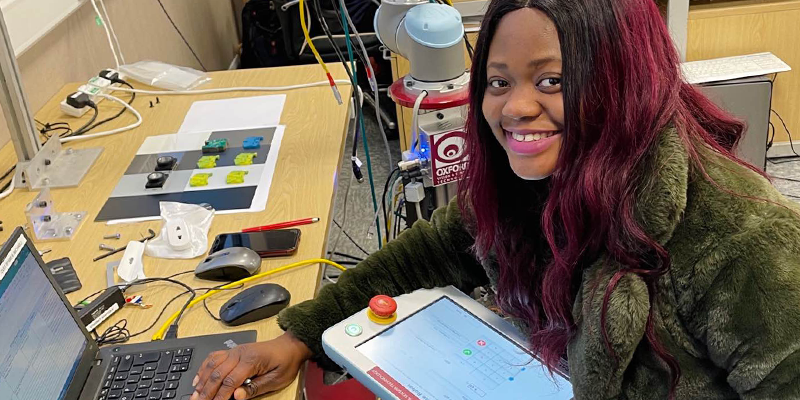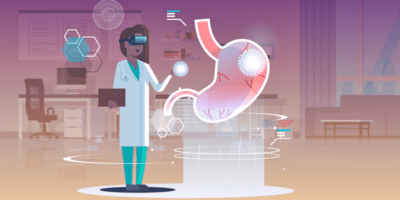Oyinmiebi Elena Ebikefe is a robotics and artificial intelligence (AI) engineer from Nigeria. She holds a first-class honours degree in electrical and electronics engineering, which led her to explore industrial automation, where she subsequently became hooked on robotics and AI. She went on to secure an MSc in Control, Automation and Artificial Intelligence at Coventry University and is open to robotics opportunities whilst she continues to develop her career through self-directed study.

“Robotics uncovered a whole new side of me — I keep surprising myself with the level of discipline and focus to study, dedication, investment and results I have gained with each robotics project.”
Discovering my flow
My name is Oyinmiebi Elena Ebikefe, and I’m a robotics and artificial intelligence engineer from Nigeria. I studied electrical and electronics engineering for my bachelor’s degree in Ghana and graduated with first-class honours.
In my final year at the university, I took an industrial automation course and had my first experience with programmable logic controllers (PLCs) using the Siemens PLC. (A programmable logic controller is an industrial computer that’s been adapted for the control of manufacturing processes, such as assembly lines, machines, robotic devices. These activities require high reliability, ease of programming, and process fault diagnosis.)
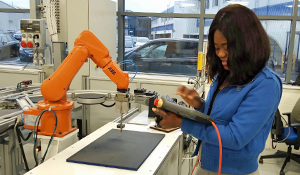
For the first time in my life, I was effortlessly doing something that excited me. Being an enthusiastic and inquisitive person, I immediately sought an internship upon graduation with an automation company in 2018. This internship further sparked my interest in control and automation, so I started seeking for funding for a master’s degree. I secured a scholarship in 2019 to study for an MSc in Control, Automation and Artificial Intelligence at Coventry University, in the UK.
A time of enlightenment
My master’s degree was very enlightening and inspiring despite the challenges caused by COVID-19. During my master’s degree, one of my modules, ‘Automation and Robotics’ piqued my interest. I had the privilege to work with an ABB robot (ABB is a prestigious industrial robotics company). I used a programmable logic controller to implement a ‘pick and place’ operation by performing online and offline robot programming using RobotStudio (ABB’s simulation and offline programming software).
Due to COVID, all graduate job opportunities were closed, but my strong curiosity about robotics drove me to volunteer at a UK-based company called Oxford Vision and Sensor Technology (OVST). This gave me the opportunity to work closely with a universal robot on a quality inspection project.
Rekindling my passion and embarking on a journey of self-directed learning
In January 2021, I had to return to Nigeria as there was low job availability in the UK due to COVID-19. In May 2020, I attended a ROS (robot operating system) 1-week training offered by The Construct, and this rekindled my passion for robotics.
Without any mentor or guidance, I created a self-development journey for myself and shared my projects on LinkedIn every week; however, I now upload new posts once a month. In the past year, I have obtained skills in:
- Programming (using Python and C++)
- Robot design (Fusion360 software)
- Robot building (Elebot, an obstacle avoidance mobile robot)
- Linux, (a family of open-source operating systems)
- Robot operating system using:
- Schematic design and printed circuit board (PCB) layout (using Proteus, design and simulation software)
- Machine vision using
- Matlab;
- LabVIEW (a graphical programming environment engineers use to develop automated research, validation, and production test systems);
- NI Vision Builder (automated Inspection is application software);
- And OpenCV (an open-source computer vision and machine learning software library);
- And Artificial Intelligence (using TensorFlow, Python, Matlab) amongst others.
Some of the projects I have completed include building: a machine vision inspection tool; an optical character recognition system; an object detection application; and a convolutional neural network for the classification of waste into recyclable, non-recyclable and organic categories.
It has been quite a journey, learning and evolving as I sought to discover my passion. Now I can finally say that I have discovered it. Robotics uncovered a whole new side of me — I keep surprising myself with the level of discipline and focus to study, dedication, investment and results I have gained with each robotics project. I am excited for what the future holds and I am truly looking forward to the endless possibilities for me to learn and add value to the field of robotics.
Building the future
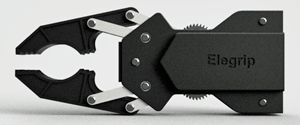
I recently wrapped up a 3D CAD design project of a gripper for my universal robot which I had previously designed. The plan is to connect the gripper to the robot to simulate a pick and place operation on the MoveIt platform. Also, I am prepared for my next project where I would be attaching a camera to my Robot, named Elebot. With the new eyes of Elebot, I intend to extend the capability of Elebot to include Machine Vision (the ability of a computer to ‘see’), and eventually, AI.
There are lots of exciting innovations happening in the robotics and AI space. However, I am personally excited about the disruptive innovations in robotics and AI for assisted living, offshore industries, agriculture, health care, transportation and space exploration. The list is endless!
My role models
I have always felt that it is imperative to have a mentor in my field because I understand the importance of a mentor in shaping and advancing one’s career. Although I would love to have one, I currently do not have anyone, with advanced skills in robotics, within proximity to me that could fill that role. Thus, in the meantime, I constantly draw inspiration and a boost of confidence and drive from the amazing women I consider to be my role models. There are a lot of amazing Roboticists that I look up to, but I would say that my top two role models are Ayanna Howard and Helen Greiner.
I got to know about Ayanna Howard on LinkedIn and I remember saying to myself: “This could be you someday”. I’m fascinated with people who dare to do things differently, so I was immediately curious about Ayanna Howard after seeing that she was the first woman to lead the Ohio State College of Engineering. After further research, I became intrigued by her outstanding research, publications, awards and contribution to robotics and AI. One thing was common across her career progression: consistent value creation and active contribution to making mankind better. For example, she founded Zyrobotics for helping children with special needs.
Helen Greiner is the co-founder of iRobot, former CEO of CyPhy Work and CEO of Tertill Corporation. She is truly inspiring to me, as I dream of running a robotics company someday. I get intrigued whenever I see women leading companies as founders or CEOs and making contributions to the robotics space.
However, it would be a pleasure to actually connect with and have an active mentor in robotics. It would be an honour and a dream come true to be connected with my role models and other amazing roboticists that are already adding value and contributing to the robotics and AI space.
Ethical considerations
I believe that one of the major ethical implications of robotics and AI is the possibility of an increase in unemployment. Other ethical implications include:
- The threat to security;
- The possibility of humanoid robots receiving certain statuses e.g citizenship (like Sophia) and what legal rights they would have;
- Possibility of robots surpassing humans in intelligence;
- Possibility of AI bias, as they are influenced by the preconceived notions of the human creator;
- The behavioural morality of autonomous robots: It could be positive e.g. robots and humans collaborating effectively to achieve goals, or negative in terms of the possibility of robots programmed to manipulate humans or wreak havoc.
Engineers are meant to be creative solvers of real-life problems, so it is paramount for every robotics engineer to be aware of these possible ethical challenges to avoid creating bigger problems than they are trying to solve. Robotics and AI Engineers should take all ethical implications into consideration to prevent this technology from being a threat to life and livelihood. As we create innovative solutions, the onus is on us to ensure that we are building safe and secure technology for the benefit of future generations.
Advice on careers in robotics
Robotics can seem scary at the beginning, so I would advise girls and women interested in robotics to just dive in and get hands-on experience. It is important to:
- Get a good understanding of basic electronics concepts;
- Make use of available resources on YouTube or google “Automatic Addison” for guidance to build your first robot. Afterwards, start working on pet projects for better understanding;
- Study the fundamentals of robotics;
- Learn about robot design using 3D CAD (computer-aided design) software like Fusion360 or Solidworks;
- Learn how to program starting with Python language. I recommend the Python for Data Science course by Cognitive Class;
- Connect with fellow robotics enthusiasts, ask questions, and share ideas;
- Robot Operating System (ROS) is another good place to start because it enables you to build your own robotics applications and gives you the freedom to build your own robot, simulate and control it. I recommend The Construct platform because I found their mode of lecture delivery quite easy to understand.
Once you get involved in robotics, you come to discover that although it is highly technical, it is not as difficult as it seems.
The visibility issue
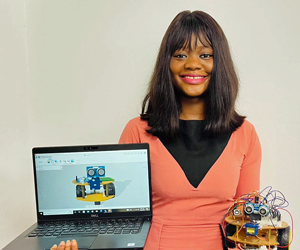
They could also provide robotics internships, as this would provide a pathway to easily incorporate them into the field. Furthermore, I would suggest that organisations sponsor promising candidates to join them at their onsite location as it would be a valuable investment to secure great talent.
Coming up
I am looking forward to pursuing my passion for robotics full time, so I am actively searching for opportunities to get into the space. I’d also love to learn about your robotics projects so feel free to reach out to me on LinkedIn if you’d like to connect.

